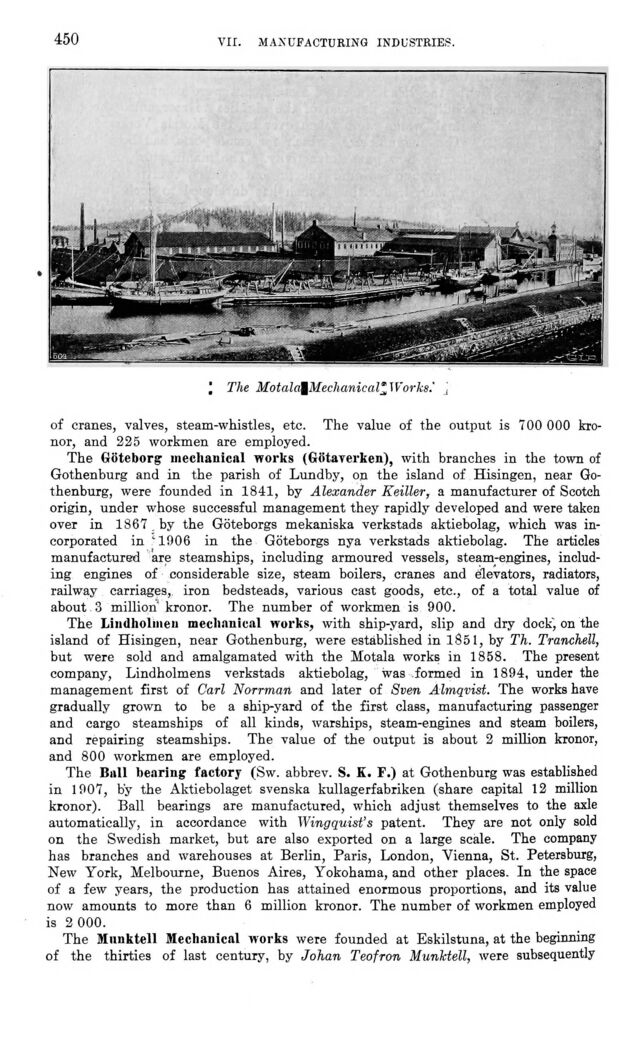
Full resolution (JPEG) - On this page / på denna sida - VII. Manufacturing Industries. Introd. by [G. Sundbärg] K. Åmark - 10. Metal and Machine Industry. By Alf. Larson

<< prev. page << föreg. sida << >> nästa sida >> next page >>
Below is the raw OCR text
from the above scanned image.
Do you see an error? Proofread the page now!
Här nedan syns maskintolkade texten från faksimilbilden ovan.
Ser du något fel? Korrekturläs sidan nu!
This page has never been proofread. / Denna sida har aldrig korrekturlästs.
450
vii. manufacturing industries.
^ The Motala^Meehanical^Works.’ j
of cranes, valves, steam-whistles, etc. The value of the output is 700 000
kronor, and 225 workmen are employed.
The Göteborg’ mechanical works (Götaverken), with branches in the town of
Gothenburg and in the parish of Lundby, on the island of Hisingen, near
Gothenburg, were founded in 1841, by Alexander Keiller, a manufacturer of Scotch
origin, under whose successful management they rapidly developed and were taken
over in 1867 _ by the Göteborgs mekaniska verkstads aktiebolag, which was
incorporated in ’1906 in the Göteborgs nya verkstads aktiebolag. The artides
manufactured are steamships, including armoured vessels, steam-engines,
including engines of considerable size, steam boilers, cranes and elevators, radiators,
railway carriages, iron bedsteads, various cast goods, etc., of a total value of
about 3 million kronor. The number of workmen is 900.
The Lindholmen mechanical works, with ship-yard, slip and dry dock’, on the
island of Hisingen, near Gothenburg, were established in 1851, by Th. Tranchell,
but were sold and amalgamated with the Motala works in 1858. The present
company, Lindholmens verkstads aktiebolag, was formed in 1894, under the
management first of Carl Norrman and later of Sven Almqvist. The works have
gradually grown to be a ship-yard of the first class, manufacturing passenger
and cargo steamships of all kinds, warships, steam-engines and steam boilers,
and repairing steamships. The value of the output is about 2 million kronor,
and 800 workmen are employed.
The Ball bearing factory (Sw. abbrev. S. K. F.) at Gothenburg was established
in 1907, by the Aktiebolaget svenska kullagerfabriken (share capital 12 million
kronor). Ball bearings are manufactured, which adjust themselves to the axle
automatically, in accordance with Wingquist’s patent. They are not only sold
on the Swedish market, but are also exported on a large scale. The company
has branches and warehouses at Berlin, Paris, London, Vienna, St. Petersburg,
New York, Melbourne, Buenos Aires, Yokohama, and other places. In the space
of a few years, the production has attained enormous proportions, and its value
now amounts to more than 6 million kronor. The number of workmen employed
is 2 000.
The Munktell Mechanical works were founded at Eskilstuna, at the beginning
of the thirties of last century, by Johan Teofron Munktell, were subsequently
<< prev. page << föreg. sida << >> nästa sida >> next page >>